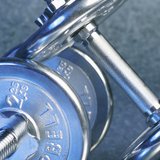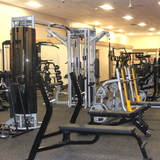How I eat for Better Health
Did you know you should always eat breakfast within one hour of waking up? Your metabolism has slowed down during the night and breakfast will help kick-start it again.
Many people think it's OK to skip breakfast because they think that means fewer calorie sums for the day. But when you skip breakfast, your hunger begins to kick in and that actually slows down your metabolism even more!
The secret to trimming down and watching your caloric intake is not to eat less, but to actually eat more sensibly.
Eating more frequently and preparing smaller meals will prevent you from feeling hungry throughout the day. It will keep your metabolism revving and your blood-sugar levels stable! And if you're eating fiber and proteins and drinking enough water, you'll actually feel fuller for longer periods of time and will not have the urge to snack on those not so healthy choices.
Try eating 5 to 6 smaller meals a day. If you take supplements, split them up and take a few every time you eat a meal. That way you get the best absorption from them rather than just eliminating them out of your body.
Here's my meal plan: Eat every 2 1/2 – 3 hours
7:00 a.m. :Eat breakfast: 1/2 cup egg whites and 1 whole egg, and ¼ cup of steel cut oats cooked with ¾ cup water, 1/2 grapefruit -- you may add 1 teaspoon of cinnamon to this to add some flavor, 1 cup of coffee and 8 oz water. One R-ALA with breakfast
9:30am -10:00 a.m.: Light snack: small organic apple and a handful of raw almonds, 8 oz water. One Silymarin.
12:00 p.m.: Lunch: 4oz roasted turkey, unlimited sauteed onions and cabbage in olive oil, (I pre-made this so all I have to do it heat it up!) 8 oz water. Take Omega 3’s.
2:30pm - 3:00 p.m.: Eat another snack or have a protein shake. I love this Rice Protein we carry – it’s organic, gluten free, vegan friendly and GMO free! There are tons of recipes located on our blog
to make your own protein shake concoction as well. And don’t forget 8 oz of water! One R-ALA and one Chromemate.
6:00 p.m.: Eat dinner: 6 oz baked salmon, small sweet potato, 2 cups broccoli, 8 oz water. Multi vitamin. (And since I am usually in bed by 9 I do not eat another snack after dinner). A good rule of thumb; after 8 is too late!
I know that the concept of weight loss and eating more food sounds comical to most, but trust me when I say this is how to boost your metabolism!
The actual process of breaking down food burns up calories! This is called the Thermic Effect of Food (TEF). It is the energy expended by our bodies in order to consume and process the foods we eat.
Remember, not all calories are created equal, and different types of foods take different amounts of energy to digest. The more nutrient dense (healthier) the food, the more calories will be burned just from eating it.
Now of course this doesn't mean eat more of the "bad unhealthy stuff”, this would be foods high in fat and empty calories. (Like cookies or French fries)
When I say "eat more" that means meals that consist of nutrient dense foods high in fiber and protein. Its okay to treat yourself every now and then, just don't overdo it! Remember the 80/20 rule. Make healthy food choices 80% of the day and you will be Okay!
And if you have a hard time eating 5 meals....DRINK IT! Make a protein shake or a green smoothie...but get something nutritious in your body!
Get a Green Protein Smoothie recipe here
Macro-nutrients what are they anyway?
Protein: Protein is one of the three macro-nutrients used as an energy source by the body (but using them for energy should be the body’s last resort), the other two being carbohydrate and fat (the fuels of preference). Without all the essential amino acids that come from proteins the body cannot build all the necessary structures to maintain life. So proteins must be in the diet to maintain the body’s structure, function and regulation of your body's cells, tissues, and organs. The energy produced by proteins is approximately 4 calories per gram. On the scale of energy required to digest different foods, this one sits at the top of the list! Digesting proteins is difficult for your body and tends to burn more calories than any other type of food. This is why we stress to you to drink your protein post workout!
Carbohydrates: The energy produced by carbohydrates is approximately 4 calories per gram. Carbs can be broken down into two groups; simple and complex. Simple carbs like sugar and refined carbs are easily digested and turned into short-lived energy by your body, and therefore burn little energy during digestion.
Complex carbs however take much more energy for your body to digest, which is why it is important to eat complex carbs like, whole grains, steel cut oats, or brown rice. Carbohydrates, such as fiber do not actually get digested by the body and used for fuel, instead they are essential for regulating the health of our digestive systems. Typically 25-30 grams of fiber per day are recommended for gastrointestinal health. Diets high in fiber have shown to reduce cholesterol levels and reduce the occurrence of colon cancer.
Fat: Along with proteins and carbohydrates, fats are one of the three macro-nutrients used as fuel and stored by the body. The energy produced by fats is approximately 9 calories per gram. Our bodies store our energy as fat. That’s why when we eat too much our bellies, hips and thighs become larger. Fat is easily digested by your body and therefore, as far as TEF (Thermic Effect of Food) goes, fats should be eaten sparingly.
The total fat you see on a food label is the sum of saturated, monounsaturated and polyunsaturated fats in that particular food for a given serving size. But not all fats are bad. In fact, the intake of monounsaturated and polyunsaturated fats can help reduce blood cholesterol when substituted for saturated fats in the diet. Foods such as olive oil, avocados, nuts and oily fish (salmon, mackerel, sardines, etc.) all contain healthy unsaturated fats.
Saturated and Trans fats are the types of fats you want to minimize or exclude from your diet if you want to maintain a healthy body. These types of fats are found in many processed foods like potato chips and cookies, and in foods found at fast-food restaurants. Be cautious of the word, hydrogenated, this means bad fat!
To summarize, calories are the measure of energy within foods. This energy comes either in the form of a protein, fat or carbohydrate. Each one of these macro-nutrients is essential to achieving a lean and healthy body.
Limit your sugar intake
Sugar turns into fat if not burned off and guess where it gets stored? Yup, your belly! Sugar intake should be five grams or less per serving.
Do not eat anything 3 hours before bedtime!
The reason you don't want to eat late at night is because your food may not properly digest. This can cause morning gas and stomach cramping. Some people who complain about feeling bloated never realize that it’s probably from the gas and food particles left over from improper digestion during sleep. You can avoid this if you cut down on the late night fridge raiding.
Eating late at night also forces your body to use its energy on digestion instead of doing what it’s supposed to do which is recuperate for the next day! During sleep you want your body to be as stress-free as possible so you can wake up feeling refreshed and energized....not tired and bloated!
However if you suffer from insomnia you can try 1 ounce of almonds and some melatonin.
Emotional Eating
This tip is easier said than done...If you are stressed, depressed or lacking something emotional in your life you may be resorting to food for comfort.
This eating habit can be the most devastating to one’s health because it causes you to eat when you're not hungry, which leads to over eating and consuming too many calories. This type of eating usually leans towards poor quality food choices, which can lead to obesity, high cholesterol, pre-diabetes and more.
With emotional eating you may think you are a hungry but in reality you may just be feeling alone and are using food to comfort you to fill a void. Stress and depression can also cause an increase production of the hormone called cortisol and too much of this hormone can add more belly fat. If this is a problem for you, it's important to seek help from a professional....or at least reach out to a friend or health coach.
Drink your water!
Never undervalue the power of water. In addition to healthy food choices and exercise, water is a great weight loss supporter. Drinking half your body weight in ounces of water per day is a simple calculation to ensure you are well hydrated. For example, if you weigh 150 pounds, it is recommended that you drink approximately 75 ounces of water per day...and remember when you exercise most people sweat 1 quart, so don't forget to replenish!
If your primary goal is losing fat, then there MUST be a caloric deficit but not too drastic. It’s the NUMBER ONE requirement of a fat loss plan.
Take care of your body; it's the only place you have to live.
xoxo
-Laurie Gouley
Health Coach

Bookmark & Share
User Comments
Be the first to comment on this post below!
Previous Article
Next Article
Most Popular Articles
- Kim's Weight Loss Journey with Integrity Health Coaching Fitness Centers & Gyms in NH
- New Year's - The 12 Months of Christmas!
- Your Scale, Throw It Out.
- KARINA'S CREAMY DETOX SOUP RECIPE WITH COCONUT MILK
- Get Blown Away!
- Store Special April 2 - 7
- Almond Encrusted Chicken
- SAVE THE DATE & REGISTER!! - TEAM INTEGRITY
About Integrity
Integrity Health is a franchise company residing in New Hampshire. We specialize in health coaching centers combining fitness with weight loss to optimize and promote optimal health. We are also the national purveyors of the RAMP Metabolic Fitness Prescription licensed by fitness professionals.
HEALTH COACHING LOCATIONS

491 Main Street
Gorham, NH 03581

1857 White Mountain Highway
North Conway NH 03860

Solutions For Fitness Centers

